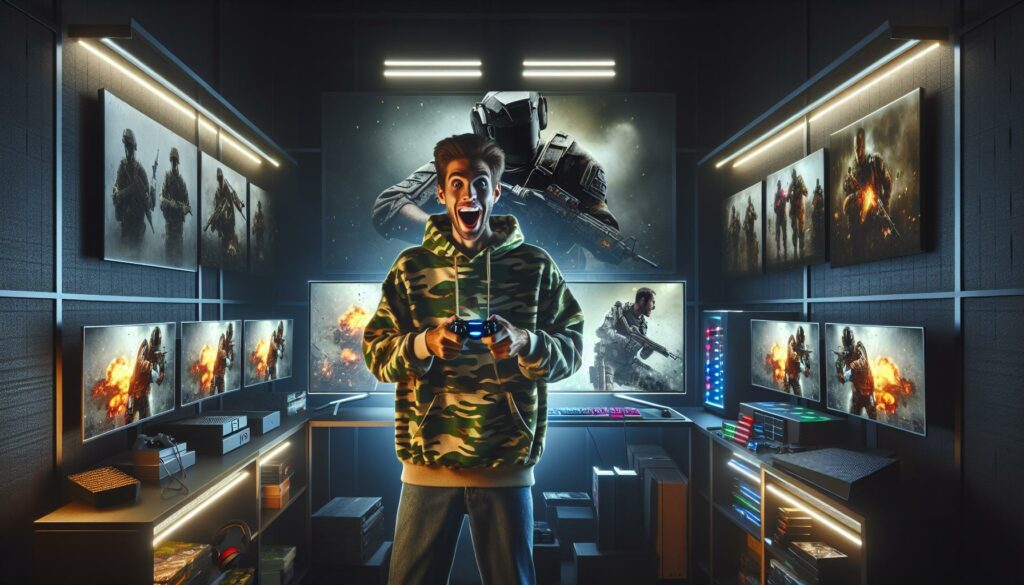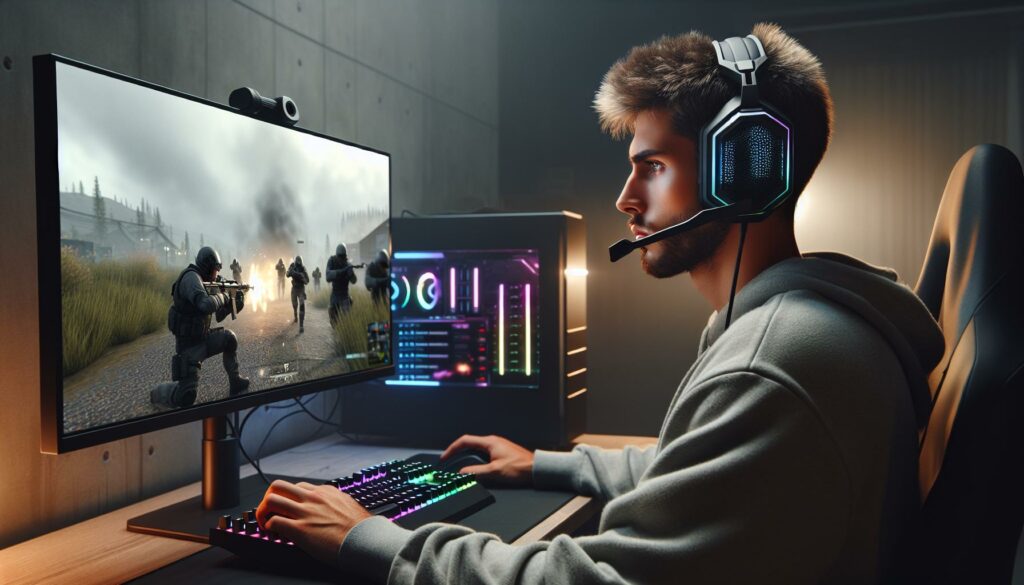”
Getting better at Call of Duty isn’t just about playing more; it’s about playing smarter. As a passionate gamer, I know the thrill of leveling up my skills and dominating the competition. Whether you’re a newbie or a seasoned player, there are strategies that can elevate your gameplay and keep you ahead of the curve.
Key Takeaways
- Master the Basics: Understanding game mechanics and controls is essential for smooth and effective gameplay in Call of Duty.
- Explore Game Modes: Familiarize yourself with various modes, including Multiplayer, Warzone, Campaign, and Zombies, as each requires different strategies and skills.
- Optimize Controls and Settings: Adjust sensitivity, control layouts, and audio/graphics settings to enhance your gameplay experience and responsiveness.
- Enhance Aim and Accuracy: Utilize aim training maps and custom games to practice aiming techniques, and regularly adjust sensitivity settings for optimal control.
- Gain Map Knowledge: Know key locations and callouts for improved team communication and strategic movement across maps.
- Develop Game Sense: Focus on situational awareness and reading opponents to make better decisions during gameplay and improve overall performance.
How to Get Better at Call of Duty
Mastering the basics of Call of Duty sets a strong foundation for skill improvement. Understanding game mechanics and controls makes gameplay smoother and more effective.
Game Modes Explained
Call of Duty offers several game modes, each presenting unique objectives and challenges. Familiarizing yourself with these modes enhances strategic gameplay.
- Multiplayer: Compete against other players in fast-paced matches, focusing on teamwork and tactical skills.
- Warzone: Experience a battle royale format where survival and resource management are crucial.
- Campaign: Engage in storytelling through single-player missions, focusing on narrative and character development.
- Zombies: Team up to fend off waves of undead enemies, emphasizing cooperation and strategy.
Each mode requires specific skills and adaptations to thrive.
Essential Controls and Settings
Understanding controls and settings significantly influences gameplay effectiveness. Customized settings can accommodate personal playstyles.
- Sensitivity Settings: Adjust aiming speed to enhance precision and responsiveness during combat.
- Control Layout: Choose a layout that feels comfortable, whether it’s default or customized; find what suits your playstyle.
- Audio Settings: Optimize audio for identifying footsteps and enemy movements, creating a sensory advantage.
- Graphics Settings: Lower graphics settings can improve frame rates, ensuring smooth performance during intense gameplay.
Fine-tuning these settings helps maximize performance and enjoyment in Call of Duty.
Improving Your Aim and Accuracy
Improving aim and accuracy is crucial for excelling in Call of Duty. Fine-tuning settings and practicing techniques can enhance your overall gameplay.
Sensitivity Settings
Sensitivity settings directly affect aiming precision. I found that a lower sensitivity often enhances control, especially for long-range shots. Conversely, higher sensitivity can benefit close-quarters engagements. Adjust the horizontal and vertical sensitivity based on personal preference but aim for balance. Gradually test different levels during matches. Most players hover around a sensitivity between 4 and 7 for better control. Use the aim assist feature if available; it can compensate for minor adjustments during target acquisition.
Practice Techniques
Incorporating specific practice techniques helps refine aim and accuracy.
- Aim Training Maps: Utilize community-made maps designed for improving aiming skills. These maps often include various drills, such as target tracking and flick shots.
- Custom Games: Set up custom matches against bots to practice aiming under controlled conditions. Adjust difficulty levels as skills improve.
- Aim Trainers: Use dedicated aim trainers, such as Kovaak’s or Aim Lab, to systematically enhance muscle memory and reflexes.
- Game Modes: Engage in modes like Gunfight or Team Deathmatch, where quick reflexes and precision are paramount. Tracking performance stats helps identify areas for growth.
- Recording and Reviewing: Record gameplay sessions and review footage to analyze missed shots and seek improvements.
By fine-tuning sensitivity settings and implementing consistent practice techniques, players can significantly bolster their aiming capabilities in Call of Duty.
Mastering Map Knowledge
Understanding map layouts enhances gameplay and decision-making in Call of Duty. Familiarity with key locations and effective movement strategies can significantly elevate performance.
Key Locations and Callouts
Identifying key locations on the map is crucial for strategic gameplay. Key areas include high-ground positions, choke points, and objective locations. Learning the callouts associated with these areas promotes better communication with teammates. Common callouts often revolve around landmarks, such as “”Red Barn”” or “”A Site,”” to quickly relay critical information. Practice consistently using these callouts during matches to strengthen team dynamics and decision-making.
Effective Movement Strategies
Movement strategies can determine survival and success. Employ techniques like crouch-shooting to minimize exposure and increase accuracy. Utilize sprinting and sliding to evade enemy fire and navigate the map quickly. Mastering jumping while shooting enables you to unpredictably dodge attacks. Additionally, learn to navigate the environment by using walls, vehicles, and cover effectively. Maintain situational awareness, observing enemy patterns and map flow, to optimize movement and anticipate engagements.
Developing Game Sense
Developing game sense is crucial for becoming a competitive player in Call of Duty. Focusing on situational awareness and reading opponents can greatly improve decision-making and overall gameplay.
Situational Awareness
Situational awareness involves constantly assessing the game environment. I keep an eye on the minimap, which shows teammate positions and indicates enemy movements. Listening for audio cues, like footsteps or gunfire, helps me gauge enemy activity and location. I also note environmental factors, such as visibility and cover options. By understanding these elements, I can make quick decisions, such as when to engage or retreat.
Reading Opponents
Reading opponents requires observing their movements and gameplay patterns. I pay attention to how enemies react in different situations, which can reveal their intentions. If an opponent consistently camps in a specific area, I can use that knowledge to strategize my approach. Additionally, recognizing trends in player behavior, such as how they respond in close-quarters combat or sniping situations, allows me to anticipate their next move and counter effectively. This proactive mindset boosts my chances of gaining the upper hand in engagements.
Working with Your Team
Working effectively with a team is essential for success in Call of Duty. Coordinated efforts can lead to winning strategies and improved performance.
Communication Strategies
Effective communication drives team success in Call of Duty. Utilizing clear callouts promotes quick responses and strategic planning. I prioritize using concise terms to describe enemy locations, actions, and my own status. This clarity prevents misunderstandings and enhances coordination. Implementing voice chat or quick message systems can facilitate real-time communication, allowing us to adapt to dynamic situations. Additionally, discussing strategies before matches sets a clear game plan, fostering teamwork and cooperation.
Role Assignment and Specialization
Role assignment within the team optimizes gameplay efficiency. Each player can focus on their strengths, such as sniping, assault, or support. I find that defining roles before a match allows for a balanced approach to gameplay. For instance, designating a designated scout to gather intel improves situational awareness. Specializing in certain weapons and loadouts helps tailor strategies to specific situations, enhancing overall team effectiveness. Players should regularly assess their performances and communicate any role adjustments needed for optimal team synergy.
Improving at Call of Duty is all about smart strategies and consistent practice. By focusing on the fundamentals and honing your skills in various game modes you’ll gain the competitive edge you need. Mastering map layouts and enhancing your aim are crucial steps that can elevate your gameplay.
Don’t underestimate the power of teamwork and communication. By working closely with your squad and defining roles you can create a more effective gaming experience. Remember to stay proactive and adapt your strategies based on the gameplay environment. With dedication and the right approach you’ll see significant improvements in your performance. Keep pushing your limits and enjoy the journey to becoming a better player.



